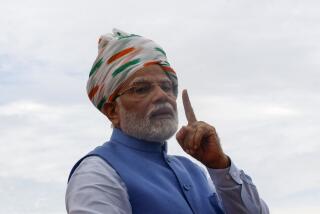HIGH STAKES FOR THE BBC IN AD DEBATE
- Share via
LONDON — To advertise or not to advertise?
Should the ad-free British Broadcasting Corp. soil itself by running commercials a la United States TV? Or should it continue to suffer the slings and arrows of outrageous financial misfortune?
That is the critical question facing the world’s best broadcasting system.
Stakes are high. If advertising is allowed on the BBC, will it start the corporation down a “slippery slope of destruction,” as BBC Chairman Stuart Young has gloomily prophesied?
Americans have a stake in this.
Some of the best programs on U. S. television, available chiefly via PBS, are produced here, either by the BBC or by one of the 15 independent companies making up this nation’s Independent Television (ITV). If advertising is allowed on the BBC, “Masterpiece Theatre” could become Masterpiece Thudder.
Some might see this as good fortune for PBS, in that any trimming of quality British TV could force PBS into additional (and costlier) domestic production. A frequent rap against PBS is that it’s too Brrrrritish. But with PBS’ continued poverty under the Reagan Administration, where would the funds come from for more domestically produced programs?
Money is also said to lie behind the BBC’s problems.
Although cable and direct-broadcast satellite transmission may be nearing, Britishers have just two TV choices. One is ad-supported ITV. The other is the BBC, financed solely by an annual license fee on households with TV sets.
The license fee was recently raised from $58 to $71.
It’s not easy escaping it. In a bit of Big Brotherism, trucks with radar-like revolving electronic devices able to detect TV signals are periodically sent out by the government to uncover fee non-payers.
Meanwhile, the BBC insists that it needs far more than an $18 hike to pay for the classy programs that earn it international plaudits.
Others, including some members of Parliament, contend that even this increase is too large and that another way should be found to pay BBC bills.
Some BBC critics, including Prime Minister Margaret Thatcher, suggest that financial relief be sought at least in part from that BBC unmentionable . . . advertising.
Uh oh.
Can it be that viewers will soon hear on the BBC--quaintly nicknamed “Auntie”--that Brand X offers “30% more topping than other pizzas?”
The matter is so serious that Home Secretary Leon Brittan has set up a 15-month inquiry into the BBC’s financing. The inquiry, under the direction of Edinburgh economics professor Alan Peacock, is to determine if advertising or other revenue sources could replace or supplement the present license fee, a regressive tax that is hardest on the poor.
BBC officials strongly reject the concept of advertising on their network. “Advertisers start to make the rules when they judge which programs they want to invest in,” BBC Managing Director Bill Cotton said. “That doesn’t make for creative ideas.”
U.S. television is evidence of that.
The BBC opposition was predictable. However, the ad-sponsored companies that own ITV have also been critical of proposed BBC advertising.
Since its establishment in 1955, ITV has often emulated the more prestigious BBC in quality. And so if the example-setting BBC’s quality falls, as the argument goes, so will ITV’s.
Advertising advocates argue that commercials haven’t seriously smudged ITV. The rebuttal is that the ITV companies have not had to grovel in the dirt for ratings because there’s been enough advertising revenue for everyone.
That could change if there were commercials on the giant BBC.
ITV, which is limited to six commercial minutes per hour, has recently seen its own advertising slump, even though its ratings still surpass the BBC’s.
The ITV companies contend that there would be too few sponsors to go around if the BBC were in the ad hunt. They fear that advertising rates would plunge, causing all of British broadcasting to sink.
And when many say sink , they have in mind the level of most ad-supported TV in the United States.
“It would lead to the same scrap for revenue that you find in U. S. television,” said Sir Dennis Forman, managing director of Granada Television, producer of such soaring television programming as “The Jewel in the Crown” and “Brideshead Revisited.” “If you have to scrap for ratings, shows like ‘Jewel’ and ‘Brideshead’ will quietly fade away.”
And, consequently, so would some of the best and most distinctive TV viewing in the United States.
“Auntie” has not been all that prim herself in scratching for funds. Trying to convince the public that it deserved a whopping license fee, the BBC has engaged in such ratings-building stunts as deploying ABC’s middlebrow blockbuster “The Thorn Birds” opposite Granada’s smashing “Jewel in the Crown.”
“The Thorn Birds” cleaned up. An omen for the future?
More to Read
The biggest entertainment stories
Get our big stories about Hollywood, film, television, music, arts, culture and more right in your inbox as soon as they publish.
You may occasionally receive promotional content from the Los Angeles Times.










